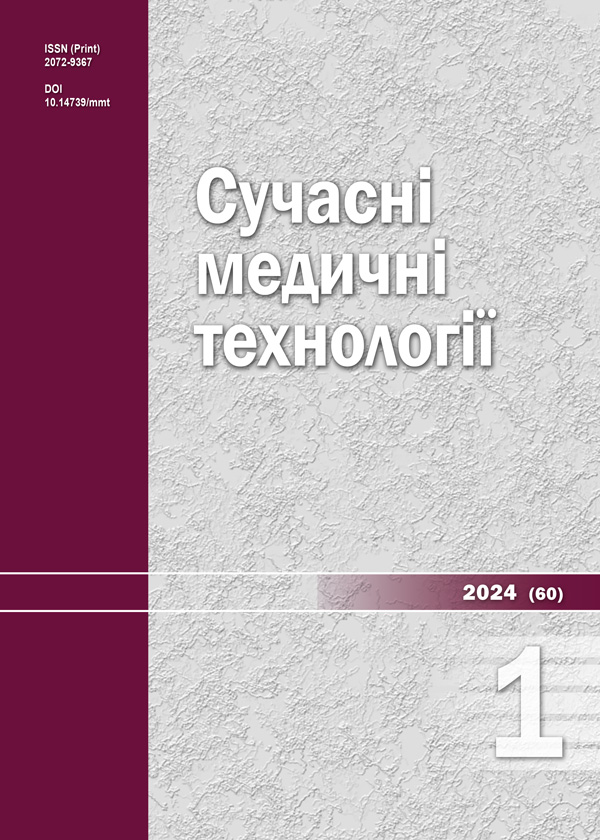Hantavirus infection in a child: clinical case
DOI:
https://doi.org/10.14739/mmt.2024.1.298489Keywords:
Hantavirus infections, anti-glomerular basement membrane disease, child, diagnosisAbstract
Hantavirus infection is a rare zoonotic viral disease characterized by fever, interstitial pneumonia, acute respiratory failure, respiratory distress syndrome, acute heart failure, renal failure and digestive tract disorders.
The aim of the work is to acquaint practitioners with the case of hantavirus infection in a child.
Materials and methods. The child was treated at Zaporizhzhia City Pediatric Hospital No. 5. He underwent clinical and biochemical blood tests, microbiological, radiological and ultrasound examinations using hospital equipment. Determination of immunoglobulins M and G to hantavirus by immunofluorescence analysis was conducted in a reference laboratory.
Results. The child was admitted with complaints of headache, fever, epigastric pain, vomiting and stools with blood, shortness of breath, cough, blood in sputum, muscle pain, decreased diuresis. Laboratory findings included leukocytosis, anemia, thrombocytopenia, elevated ESR, elevated procalcitonin and creatinine levels, and hypercoagulability. Instrumentally, right-sided interstitial pneumonia and duodenal ulcer were diagnosed. The positive result for hantavirus infection was confirmed by the levels of immunoglobulins M and G to hantavirus and the increase in their titers in the dynamics. Comprehensive intensive care resulted in relatively rapid recovery of the child.
Conclusions. The criteria for the diagnosis of hantavirus infection with pulmonary and renal syndromes are: the presence of interstitial pulmonary edema, fever with myalgias, arthralgias, cephalgia, nausea, vomiting and headache, followed by oliguria. Neutrophilic leukocytosis, anemia, thrombocytopenia, increased hematocrit, proteinuria, and microhematuria are characteristic. Determination of IgM and G to hantavirus and their dynamics is effective for confirming the diagnosis. Hantavirus infection is rather rare in Ukraine. Clinical discussions of diseases that are rarely occurring in practice are useful for physicians and will facilitate a faster diagnostic search.
References
Mocanu A, Cajvan AM, Lazaruc TI, Lupu VV, Florescu L, Lupu A, et al. Hantavirus Infection in Children-A Pilot Study of Single Regional Center. Viruses. 2023;15(4):872. doi: https://doi.org/10.3390/v15040872
Faisal S, Badshah SL, Sharaf M, Abdalla M. Insight into the Hantaan virus RNA-dependent RNA polymerase inhibition using in-silico approaches. Mol Divers. 2023;27(6):2505-22. doi: https://doi.org/10.1007/s11030-022-10567-6
Milholland MT, Castro-Arellano I, Suzán G, Garcia-Peña GE, Lee TE Jr, Rohde RE, et al. Global Diversity and Distribution of Hantaviruses and Their Hosts. Ecohealth. 2018;15(1):163-208. doi: https://doi.org/10.1007/s10393-017-1305-2
Yang B, Yang KD. Immunopathogenesis of Different Emerging Viral Infections: Evasion, Fatal Mechanism, and Prevention. Front Immunol. 2021;12:690976. doi: https://doi.org/10.3389/fimmu.2021.690976
Lupuşoru G, Lupuşoru M, Ailincăi I, Bernea L, Berechet A, Spătaru R, et al. Hanta hemorrhagic fever with renal syndrome: A pathology in whose diagnosis kidney biopsy plays a major role (Review). Exp Ther Med. 2021;22(3):984. doi: https://doi.org/10.3892/etm.2021.10416
Llah ST, Mir S, Sharif S, Khan S, Mir MA. Hantavirus induced cardiopulmonary syndrome: A public health concern. J Med Virol. 2018;90(6):1003-9. doi: https://doi.org/10.1002/jmv.25054
Flórez-Álvarez L, de Souza EE, Botosso VF, de Oliveira DBL, Ho PL, Taborda CP, et al. Hemorrhagic fever viruses: Pathogenesis, therapeutics, and emerging and re-emerging potential. Front Microbiol. 2022;13:1040093. doi: https://doi.org/10.3389/fmicb.2022.1040093
Lu S, Zhu N, Guo W, Wang X, Li K, Yan J, et al. RNA-Seq Revealed a Circular RNA-microRNA-mRNA Regulatory Network in Hantaan Virus Infection. Front Cell Infect Microbiol. 2020;10:97. doi: https://doi.org/10.3389/fcimb.2020.00097
Riabokon OV, Furyk OO, Kalashnyk KV. A case of severe COVID-19 and influenza co-infection. Zaporozhye medical journal. 2023;25(5):477-82. doi: https://doi.org/10.14739/2310-1210.2023.5.277452
Mammas IN, Drysdale SB, Charalampous C, Koletsi P, Papatheodoropoulou A, Koutsaftiki C, et al. Navigating paediatric virology through the COVID 19 era (Review). Int J Mol Med. 2023;52(3):83. doi: https://doi.org/10.3892/ijmm.2023.5286
Dowsett T, Oni L. Anti-glomerular basement membrane disease in children: a brief overview. Pediatr Nephrol. 2022;37(8):1713-9. doi: https://doi.org/10.1007/s00467-021-05333-z
Naylor RW, Morais MRPT, Lennon R. Complexities of the glomerular basement membrane. Nat Rev Nephrol. 2021;17(2):112-27. doi: https://doi.org/10.1038/s41581-020-0329-y
Rohm CL, Acree S, Shrivastava A, Saberi AA, Lovett L. Antibody-Negative Relapse of Goodpasture Syndrome with Pulmonary Hemorrhage. Case Reports in Medicine, 2019;2019:2975131. doi: https://doi.org/10.1155/2019/2975131
Saha BK. Idiopathic pulmonary hemosiderosis: A state of the art review. Respiratory Medicine, 2021;176:106234. doi: https://doi.org/10.1016/j.rmed.2020.106234
Menzi CP, Bucher BS, Bianchetti MG, Ardissino G, Simonetti GD. Management and outcomes of childhood Goodpasture's disease. Pediatric Research, 2018;83(4):813-7. doi: https://doi.org/10.1038/pr.2017.315
Downloads
Published
How to Cite
Issue
Section
License
The work is provided under the terms of the Public Offer and of Creative Commons Attribution-NonCommercial 4.0 International (CC BY-NC 4.0). This license allows an unlimited number of persons to reproduce and share the Licensed Material in all media and formats. Any use of the Licensed Material shall contain an identification of its Creator(s) and must be for non-commercial purposes only.














